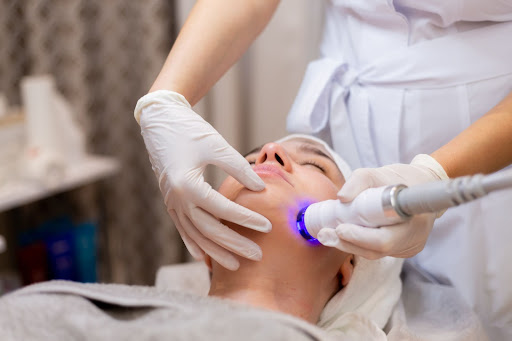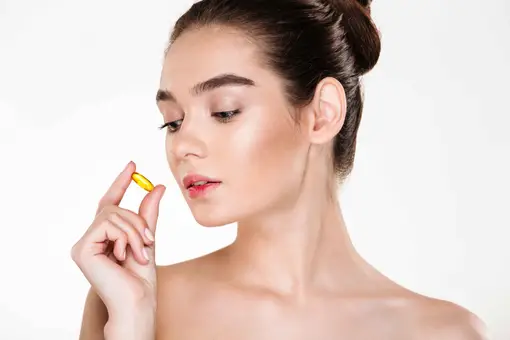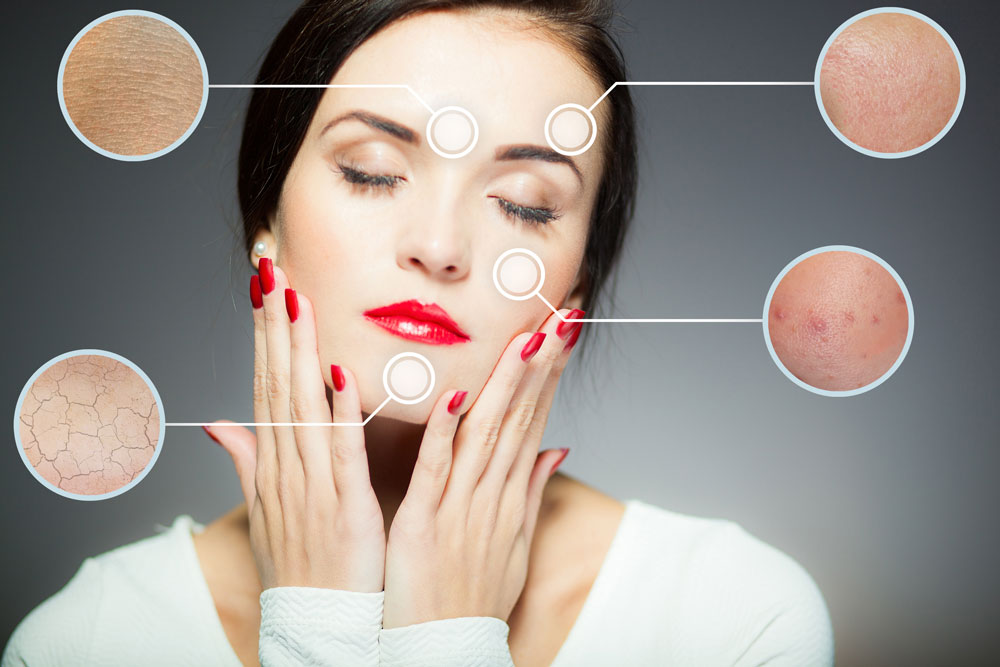
Most of us yearn for bright and glowing skin and have already tried the numerous skin care products available on the market, but in vain. However, you have a solution now – glutathione. This ingredient is widely used as a skin-brightening agent. While those who have used glutathione claim that it may help brighten the skin and reduce dark spots, research is insufficient regarding this.
If you have never heard of this name and want to know more about it, we can help. Keep reading to know more about glutathione, how it works for your skin, and the potential side effects.
Know Your Ingredient:
What Is It?
A naturally occurring tripeptide that is found in most lifeforms, including humans.
What Are Its Benefits?
It helps in cellular health maintenance and safeguards cells from oxidative stress.
Who Can Use It?
Anyone can take it except people who are on antipsychotic and/or chemotherapy medications.
How Often?
As a maintenance dose, you can take 500 mg daily.
Caution
Avoid taking glutathione if you are pregnant or breastfeeding. It may also trigger asthma attacks, macular erythema, red spots, or tiredness in some people.
In This Article
1. What Is Glutathione?
2. How To Use Glutathione For Skin Brightening
3. Potential Side Effects Of Glutathione
4. What Happens When You Stop Taking Glutathione?
5. Infographic: What To Eat To Increase Glutathione Production In Your Body
6. Frequently Asked Questions
7. Key Takeaways
8. Illustration: Glutathione For Skin Brightening: How It Works & How To Use It
What Is Glutathione?
Even though glutathione is one of the best antioxidants of all time, it is still unknown to a large number of people. It is best known for helping brighten your skin and reducing the levels of melanin productioni too (1). Doctors and dermatologists from all over the globe have often used glutathione during skin treatments and therapies.Most of the time it is used while manufacturing creams or skin-brightening tablets for consumption. You can get hold of them from the nearest dispensary or simply place your order online.
How Does It Work?

Glutathione contains amino acidsi in abundance. The best part about this antioxidant is that it is considered safe and doesn’t have any free radicals or toxins that could ruin your skin. In fact, it may help in cleansing your skin and removing all impurities, which helps make the skin appear brighter. Moreover, using glutathione may help reduce spots and hyperpigmentation levels. It helps in the activation of enzymes that play an important role in detoxification (2). However, remember that the results may not be the same for everyone. It may vary from person to person. Further human studies are required to substantiate the claims.
Although there are a large number of products that help brighten your skin, it is best to go natural! As already discussed, glutathione contains amino acids that reduce side effects and keep your skin healthy and safe in the long run. However, remember that research is inadequate regarding the efficacy and potential side effects of glutathione. Therefore, do not take its supplement or use topical products containing glutathione without consulting a doctor.
How To Use Glutathione For Skin Brightening

You can take glutathione skin-brightening supplements given by your doctor or dermatologist.
Moisturize your skin with the help of I-glutathione pills that will prevent the flaking of the skin.
However, using glutathione alone may not help brighten your skin. It has to be used as suggested by the doctor and in conjunction with other treatments. You also have to follow a healthy lifestyle, skin care practices (like using sunscreen daily), and dietary habits. Also, there are chances the results will be temporary if you do not take care of your skin properly.
How Does Glutathione Help In Brightening Your Skin?

Glutathione helps brighten the skin through its powerful antioxidant and melanin-inhibiting properties. Here’s how it works:
1. Inhibits Melanin Production:
Glutathione directly affects melanin, the pigment responsible for skin color. It interrupts the activity of the enzyme tyrosinase, which plays a key role in melanin production. By reducing tyrosinase activity, glutathione shifts melanin production from eumelanin (which causes darker pigmentation) to pheomelanin (which results in lighter pigmentation). This helps lighten skin tone and reduce dark spots or hyperpigmentation.
2. Fights Oxidative Stress:
As an antioxidant, glutathione protects skin cells from oxidative stress caused by free radicals. Free radicals can damage skin cells, accelerate aging, and lead to dull, uneven skin tone. By neutralizing these free radicals, glutathione promotes healthier, more radiant skin.
3. Promotes Even Skin Tone:
Regular use of glutathione can lead to an even skin tone, as it reduces pigmentation irregularities such as melasma, age spots, and acne scars. Over time, it helps fade these blemishes, leaving the skin with a more consistent appearance.
4. Detoxifies and Reduces Inflammation:
Glutathione assists in detoxifying the body, especially through the liver, helping to eliminate toxins that can contribute to skin problems like acne and dullness. Its anti-inflammatory properties also help reduce redness and irritation, leading to clearer, brighter skin.
How to Use Glutathione for Skin Brightening:
- Oral Supplements: Glutathione pills or capsules can help boost internal levels, contributing to gradual skin brightening over time.
- Topical Creams: Glutathione-infused skincare products, such as creams or serums, can be applied directly to areas of hyperpigmentation or uneven skin tone.
- Intravenous (IV) Therapy: Some opt for glutathione IV treatments, which deliver higher doses directly into the bloodstream for faster results.
- Diet: Foods rich in sulfur, selenium, and vitamin C can support natural glutathione production, indirectly aiding skin brightening. Examples include cruciferous vegetables, citrus fruits, and Brazil nuts.
Results:
Skin brightening with glutathione is generally gradual and noticeable after several weeks to months of consistent use. Results vary based on skin type, dosage, and method of application.
While glutathione is considered safe, it’s always best to consult a healthcare provider before starting any supplementation regimen, especially for skin brightening purposes.
Potential Side Effects Of Glutathione
Glutathione is generally considered safe. Although research is limited research on the side effects of using glutathione for skin brightening, there are a few concerns related to the safety of this ingredient. According to a study, it was found that glutathione may cause mild skin reactions like
- Itching
- Swollen glands
- Fever
- Red spots on the skin
- Tiredness
Therefore, if you take glutathione and encounter any side effects, seek medical help as soon as possible to avoid further complications. People with sensitive skin should consult their doctor before using it. Also, avoid it if you are allergic to benzyl alcohol, a preservative found in glutathione supplements.
Interesting Fact

Glutathione is usually taken in the form of a pill that has become highly successful in Asian countries, especially in countries where people would like to have brighter skin. Even though it is pretty expensive, glutathione injections are quite popular as they significantly increase the bioavailability of glutathione. However, further research is warranted to establish this fact. It is important to take into consideration that though intravenous glutathione is considered to increase its efficacy, it can also pose the risk of overdosing and toxicity
The Dilemma That Comes With Glutathione
The dilemma surrounding the use of glutathione for skin brightening is complex and multifaceted.
Glutathione and the treatments are highly expensive, and not everyone can afford it. Nevertheless, their lotions and creams are still cheaper. However, it is important to note that the efficacy and safety of glutathione injections for skin brightening are still subjects of ongoing research and debate within the medical community.
Moreover, there are significant health and safety considerations to bear in mind when contemplating the use of glutathione injections. Injecting any substance into the body carries inherent risks, including the potential for allergic reactions, infections, and other adverse effects. Furthermore, the long-term consequences of using glutathione in this manner are not fully understood.
It is necessary to emphasize that the use of glutathione for skin brightening should only be considered after thorough consultation with a qualified healthcare provider. Self-administration of glutathione injections or relying on unregulated products may lead to serious health complications and should be avoided.
Individuals must be aware of the potential risks, lack of conclusive evidence, and the importance of prioritizing their overall health and well-being over cosmetic concerns. We strongly advise you to seek professional medical advice, consider alternative approaches, and make informed decisions while being mindful of the potential risks associated with glutathione injections.
Apart from these side effects, you may also experience a few unfavorable after-effects after stopping the intake of glutathione. Scroll down to learn about them.
What Happens When You Stop Taking Glutathione?
When you stop taking glutathione supplements or discontinue other methods of boosting your glutathione levels, several things can happen depending on your body’s natural glutathione production and overall health:
1. Gradual Return to Natural Skin Tone
If you’ve been using glutathione for skin brightening, discontinuing its use will eventually allow melanin production to return to its normal rate. As glutathione inhibits melanin synthesis, stopping it could cause your skin to gradually return to its original tone over time. Dark spots or areas of hyperpigmentation that were lightened by glutathione may also start to reappear.
2. Reduction in Antioxidant Protection
Glutathione is a critical antioxidant that protects the body from oxidative stress and free radical damage. Stopping supplementation could reduce your body’s ability to neutralize free radicals. This may increase the risk of oxidative damage to cells, potentially leading to signs of aging like dull skin, fine lines, and other skin-related issues.
3. Decline in Detoxification Efficiency
Glutathione plays a major role in detoxifying harmful substances in the liver. Without adequate glutathione, the body’s ability to detoxify toxins, pollutants, and heavy metals may be reduced. Over time, this could lead to sluggish liver function and an increase in toxin buildup in the body, possibly causing fatigue, weakened immune response, or skin flare-ups like acne.
4. Reduced Immune Support
Glutathione is essential for immune system function. It helps regulate inflammation and assists in fighting infections. When you stop taking glutathione supplements, your immune system may become less effective at managing inflammation and protecting against illnesses, especially if your natural glutathione levels are already low.
5. Potential for Rebounding of Skin Issues
Some people use glutathione to help with skin conditions like acne, hyperpigmentation, or uneven skin tone. Stopping glutathione may result in a recurrence of these issues, especially if the root causes (e.g., oxidative stress, inflammation) are still present.
How to Minimize These Effects:
- Diet: Incorporate foods that support natural glutathione production, like sulfur-rich vegetables (broccoli, cauliflower), selenium-rich foods (Brazil nuts), and vitamin C-rich fruits (citrus).
- Lifestyle: Regular exercise, proper sleep, and minimizing exposure to toxins (e.g., smoking, pollution) can help maintain natural glutathione levels.
- Skincare Routine: Continue using other antioxidants like Vitamin C, Vitamin E, or topical treatments that support skin health if skin brightening or anti-aging is your goal.
While stopping glutathione supplementation may not result in immediate drastic changes, its beneficial effects (particularly for skin and health) will slowly diminish over time if not supported by other methods.
Infographic: What To Eat To Increase Glutathione Production In Your Body
Glutathione is an antioxidant that helps brighten your skin, get rid of impurities, reduce hyperpigmentation, and help with skin rejuvenation. Though people consume glutathione in the form of pills, you can try to increase its natural production in the body by consuming certain food items rich in amino acids.
Check out this infographic to learn about some skin-brightening foods that help to increase glutathione production in your body.

Glutathione is a popular antioxidant used by dermatologists for skin treatments all over the globe. It is also popularly used in creams or pills to help brighten the skin. Glutathione may protect the skin from toxins, prevent dark spots, and remove impurities, leaving you with brighter and glowing skin. Along with glutathione, eat a diet high in vegetables such as tomatoes and asparagus to help you achieve clearer and healthier skin. You can take glutathione for skin brightening in the form of pills or creams available online. Consult your dermatologist for the correct glutathione dosage and instructions.
Frequently Asked Questions
- How long does it take glutathione to brighten skin?
It may take between 4 to 10 weeks of regular use for glutathione to show visible results (5). However, results may vary from person to person.
2. Is glutathione pill safe?
Yes, glutathione pills are considered safe for consumption in limited dosage. Consult your doctor for the appropriate dosage.
3. Will glutathione lighten my underarms?
Yes, glutathione is an antioxidant that may help lighten your underarm skin. Additionally, a healthy and balanced diet will also contribute to healthy skin.
Key Takeaways
- Glutathione contains amino acids that help you remove impurities and aid with complexion improvement.
- You may take glutathione supplements orally or moisturize with creams containing glutathione after consulting a doctor.
- Besides taking antioxidant supplements orally, there are also injections and soaps with glutathione that may help you achieve glowing skin.
- There is insufficient research regarding the efficacy of glutathione. Therefore, avoid self-medication to minimize the risk of unwanted side effects.
Illustration: Glutathione For Skin Brightening: How It Works & How To Use It

Personal Experience
Getmakeup’s articles are interwoven with authentic personal narratives that provide depth and resonance to our content. Below are the sources of the personal accounts referenced in this article.